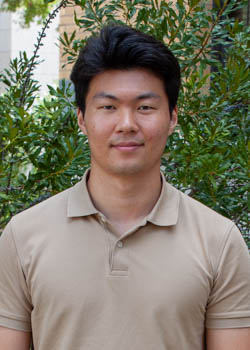Closing the nuclear fuel cycle through reprocessing used nuclear fuel would lead to a significant reduction in nuclear waste and increased efficiency for nuclear energy plants. However, fears that reprocessing is vulnerable to misuse leading to proliferation have posed a barrier to its widespread adoption as a standard practice among many nuclear energy producing countries. Ensuring that the closed nuclear fuel cycle is proliferation resistant is key to its being used by more countries around the world.

Saehyun Choi is a student working with Center for Nuclear Security Science and Policy Initiatives (NSSPI) Director Dr. Sunil Chirayath to investigate the proliferation resistance of a nuclear fuel cycle that recycles reprocessed uranium after re-enrichment. His work involves research on multicomponent mixture enrichment calculations followed by fuel cycle analysis of special nuclear material production and depletion to determine the denaturing of fissile materials.
According to Choi, “Denaturing a fissile material, such as U or Pu, is one of the intrinsic barriers that renders the fissile material less suitable and less attractive for use in a nuclear explosive device, but does not affect its value as a source of nuclear energy for civilian energy uses.”
Up to now, the re-enrichment of reprocessed uranium has been estimated using a simple binary enrichment calculation theory. However, the precise estimation of U-236 in enriched reprocessed uranium is essential for determining the proliferation resistance of reprocessed uranium. Choi developed a modified matched abundance ratio cascade model (MARC) to simulate reprocessed uranium enrichment. He then used the Monte Carlo N-Particle Transport (MCNP) computer code to simulate fuel burnup of a pressurized water reactor fuel assembly using enriched reprocessed uranium. Finally, he verified the proliferation resistance of the process by determining if the fissile materials had been successfully denatured to render them less attractive for malicious uses.
“My research was to study the enhanced production of Pu-238 in used fuel due to the presence of U-236 in enriched reprocessed uranium,” said Choi. “A MARC for the re-enrichment of reprocessed uranium and a Pressurized Water Reactor fuel assembly were modeled using the modified MARC code and MCNP, respectively, to estimate the Pu-238 production. It was found that the plutonium in the used fuel is diluted with sufficient Pu-238, which makes it hard to produce a high explosive nuclear device.”
Choi hopes that the results of this study will be useful to support the reuse of recycled uranium for energy generation in the foreseeable future. This would result in a more efficient use of uranium resources and a reduction in the need for large deep geological repositories.
Having successfully defended his thesis this summer, Choi will be graduating in August 2021 with a Master of Science degree in nuclear engineering. An active duty Captain in the Republic of Korea Army, his previous assignments include S-3 Logistics Officer of the 110th INF BN(MECH), Liaison Officer of the Eighth United States Army(EUSA), and Platoon Leader of the 102nd ABCT. Before joining NSSPI, Choi received his Bachelor’s degree in Applied Physics from the Korean Military Academy in 2013.